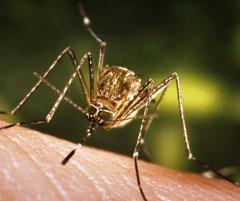
West Nile virus is the most prevalent mosquito-borne disease in the United States, according to the Centers for Disease Control and Prevention, and California had the highest number of West Nile virus cases in the nation in 2019, with 225 cases reported.
Comparatively, Texas had 32 cases and Florida had two cases in 2019. There is no human vaccine for West Nile virus, a disease that can cause debilitating cases of meningitis, encephalitis, and even death.
However, West Nile virus isn’t the only mosquito-borne threat in California. Newly established invasive Aedes mosquitoes can transmit viruses such as chikungunya, dengue, and Zika, all of which are costly to treat and can have long-term health and financial consequences.
These mosquitoes are present throughout many areas of California and are steadily expanding their range.
“While COVID-19 is not transmitted by mosquitoes, infected mosquitoes pose other public health threats,” said Peter Bonkrude, president of the Mosquito and Vector Control Association of California. “The best way to protect yourself from West Nile virus and other mosquito-transmitted diseases is to prevent mosquito bites. Wearing insect repellent and eliminating all sources of standing water are important mosquito control measures.”
Local mosquito experts are working to ensure there are adequate local, state, and federal resources to meet the increasing challenges of combating mosquito-borne diseases.
The Mosquito and Vector Control Association of California has been advocating for federal funding for the Strengthening Mosquito Abatement Safety and Health Act (SMASH Act) which would authorize CDC resources to be used to protect public health by addressing emerging infectious mosquito-borne diseases and improving existing mosquito control programs.
The Antelope Valley Mosquito and Vector Control District is advising residents to take the following steps to help prevent mosquito bites and mosquito-borne diseases:
- Apply insect repellent containing EPA-registered active ingredients, including DEET, picaridin, oil of lemon eucalyptus, or IR3535, according to label instructions. Repellents keep mosquitoes from biting. It is important to follow EPA and CDC guidelines for the safe use of repellents on children.
- Dress in long sleeves and pants, especially if outside at dawn and dusk when mosquitoes that can spread West Nile virus are most active.
- Install screens on windows and doors and keep them in good repair to keep mosquitoes out of your home.
- Eliminate all sources of standing water on your property, including in flowerpots, old tires, buckets, pet dishes, and trash cans because mosquitoes lay their eggs in very small amounts of standing water.
- Repair leaking faucets and broken sprinklers.
- Clear rain gutters clogged with leaves or debris.
- Report neglected swimming pools and day-biting mosquitoes to the Antelope Valley Mosquito and Vector Control District online at www.avmosquito.org or by calling 661-942-2917.
[Information via news release from the Antelope Valley Mosquito and Vector Control District.]
–
surfside 6 says
Mosquitos are nature’s cure for camping.
COVID-20 says
Wash your hands and wear a mask.